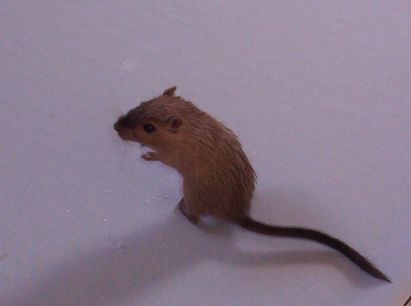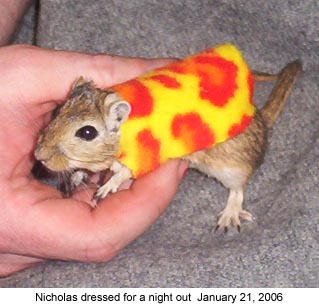|
Gerbil Care Ideas

Gerbils, like other small animals are relatively inexpensive to buy and keep. While you can buy and set up for a small animal for less then the cost of a dog, it does not mean that the small animal deserves less care then the dog would.
It is a good idea to buy two gerbils that have been housed together, usually two males or two females. Yes, you can get one of each sex, just be forewarned, you will have many litters of babies if they are left together.
Gerbils may be housed with other gerbils that they have been housed with since young. Gerbils may not be housed with hamsters or mice or guinea pigs or fancy rats or any other species.
Your gerbils will need a home. Gerbil cages or aquariums may not cost as much as a dog kennel, but it will need to be kept clean and fresh just the same. Gerbils are desert animals and do not drink as much as many of the rodents (read pee less too) so cleaning once a week or even every ten days should be enough.
Buy a good bedding for their flooring. Aspen is a good choice but not the only type you could use. Gerbils like to dig in the bedding and move it around. It is natural and fun for them. Many people would rather use an aquarium to house gerbils for this reason (the shavings may be kicked out of a cage).

Gerbils are fun and interactive pets. They are active and need to be taught to be handled. Some will need to be tamed. Very rarely will a gerbil bite, but it can happen. They make great pets for adults and responsible children. Gerbils can and do learn to run obstacle courses and do agility as well as come to their owner and do a trick and task or two. Before training tricks or tasks you will need to tame your gerbils first.
Your pet gerbils will need a hide box of some sort. Make sure it is big enough for them but not too big for your cage door.
Wheels are important. Gerbils are lively little animals and will appreciate the exercise the wheel will offer. The wheel you choose for your gerbil needs to be at least 6 1/2". The wheels with the solid floors are safest for your pets feet and tails. Be forewarned...quiet means different things to different people and silent may not mean no noise.
Gerbil like chew toys. Many parrot toys are also fun for gerbils and other small animals.
Many people are finding that their gerbils enjoy playing, rolling and "dusting" in Chinchilla Bath Sand or Lava Dust. It is best to place the dust in a container that has a lid and a small opening for the gerbil to go into. The dust will "fly" so the lid will keep the mess in.
Gerbils should eat gerbil food. Their food comes packaged, usually for Gerbils and or Hamsters. It will be a seed mix. Many people open their gerbil food and poor it into empty clean jars with tight lids for storage. This will keep bugs and moisture out of your food. In the summer time, you may want to store your small animal's food in the refrigerator. This will keep it fresh and bug free.
I do feed my small animals fruits and veggies. I use their head size as a guide to how much to feed. With gerbils each day, a slice of, or half a grape is plenty. A small piece of apple the size of a dime is OK, or a half of an well eaten apple core a complete apple core or a thick one that has not been eaten down is not, it is too much for one gerbil, it could give them diarrhea.
PLEASE NOTE: If you are buying your first gerbil or if you have had many, please read many gerbil books and websites. There are many opinions on keeping and training pets. Keep in mind just because you read it once, it does not make it true. Many times "fads" come up in any species of animal keeping and training. Just because one or two people on an elist, group or chat list do things a certain way does not mean it is the only way. Please get several opinions from those that have kept the animals for several years.
A NOTE ABOUT MITES AND LICE
I hear it all the time.....lice and or mites came in on my shavings and or food. THIS IS NOT TRUE! Unless of course other animals of the same species have previously been on those items before they came to your home.
Lice and mites are species/host specific! Horse lice do not live on cows, rattie lice do not live on cats, they might bite and be on an animal other then there species for a short time. But they will not take up residence there.
Mites are always present and kept at bay by the immune system. If you or your animals immune system is off or compromised, the itching begins. They mites become a problem for the animal that they are on, and possibly the animals they live with of the same species.
If you think your animal has lice, look at their skin, usually on the neck. You can go to the Dollar Store and for $1 buy a pair of magnifying reading glasses. We keep a pair of 200% in our first aid kit. (splinters, small cuts, looking closely at wounds, and of course looking for bugs) You will be able to see any creepy crawly thing on animals with these glasses. Yes there is a way to know loooong before there is an infestation on an animal. If your animal has an infestation it will be scratching, not sleeping well, probably not eating well, have sores, and not be happy. If you can not see the bugs without the glasses, with them it will be very clear.
We use Ivemictrin and or Premithin on all of our animals, except the cats. I buy it in a horse tube form (like $1.99 and that will take care of 1200 pounds of animals) We place a small, size of a piece of rice, on the back of ratties head and let them clean it off. It will work for parasites in and out of animals (worms too). Mites and lice are in/on allllll living animals. Good health keeps them at bay, Stress will explode a case of them. They are also shared animal to animal and in fact person to person. I WILL NEVER USE ANOTHER PERSONS BRUSH OR COMB OR WEAR THEIR HAT! LOL
We add information to this site, as well as our sister sites often, please come back and check to see what is new with us.
| 



 In the high plains of South Dakota, USA
In the high plains of South Dakota, USA In the high plains of South Dakota, USA
In the high plains of South Dakota, USA